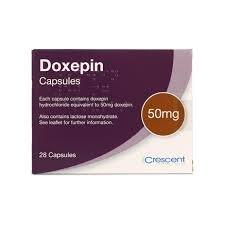What is doxepin?
doxepin
Get Now
Doxepin is a tricyclic antidepressant (TCA) that is primarily used to treat depression and anxiety disorders. It was first introduced in the 1960s and has since become well-established in psychiatric practice. In addition to its antidepressant properties, doxepin is also use to manage insomnia and certain types of chronic pain, making it a versatile medication.
Mechanism of Action
Doxepin works by affecting the balance of neurotransmitters in the brain, particularly norepinephrine and serotonin. By inhibiting the reuptake of these neurotransmitters, doxepin helps to enhance mood and alleviate symptoms of anxiety. Its sedative properties are attribute to its ability to block histamine receptors, making it effective for sleep disorders.
Uses of Doxepin
- Depression and Anxiety: It is effective in treating major depressive disorder and generalize anxiety disorder, helping to stabilize mood and reduce feelings of anxiety.
- Insomnia: Due to its sedative effects, doxepin is prescribe in lower doses for the treatment of insomnia, particularly when sleep maintenance is a concern.
- Chronic Pain: Some studies suggest that doxepin can be beneficial in managing certain chronic pain conditions, such as fibromyalgia and neuropathic pain, by altering pain perception.
- Atopic Dermatitis: Topical formulations of doxepin are use to relieve itching and inflammation associate with skin conditions like atopic dermatitis.
Dosage and Administration
It is available in various forms, including capsules, tablets, and a topical cream. The dosage varies depending on the condition being treat:
- For depression or anxiety: Typically, the starting dose for adults ranges from 75 mg to 150 mg per day, which can be adjust base on response and tolerance.
- For insomnia: Lower doses, often around 3 mg to 6 mg taken before bedtime, are recommend.
It’s essential to follow a healthcare provider’s instructions closely when using doxepin, as individual needs may vary.
Side Effects
Like all medications, It can cause side effects. Common side effects include:
- Drowsiness
- Dry mouth
- Constipation
- Blurred vision
- Weight gain
In some cases, more severe side effects may occur, including cardiovascular issues or allergic reactions. Patients should seek medical attention if they experience symptoms such as chest pain, difficulty breathing, or severe mood changes.
Precautions and Interactions
Before starting doxepin, patients should inform their healthcare provider about any existing medical conditions, particularly:
- Heart disease
- Glaucoma
- Urinary retention
- Bipolar disorder
It can interact with other medications, including other antidepressants, antihistamines, and alcohol, potentially increasing the risk of side effects. It’s crucial to disclose all medications and supplements being taken to avoid adverse interactions.



